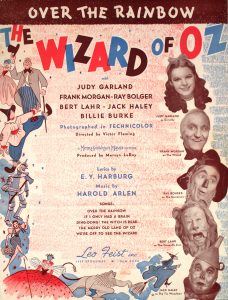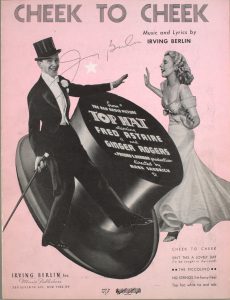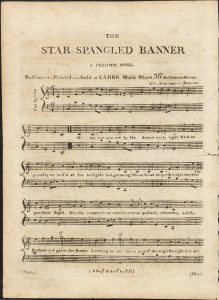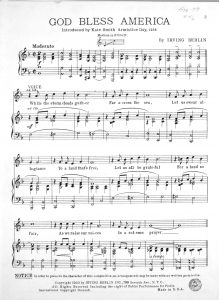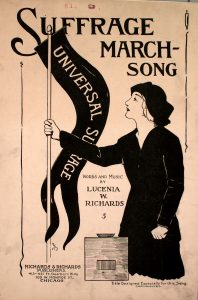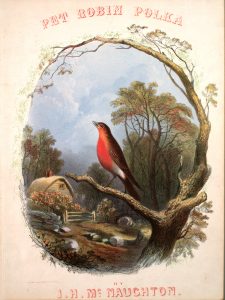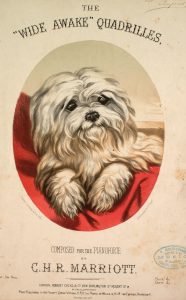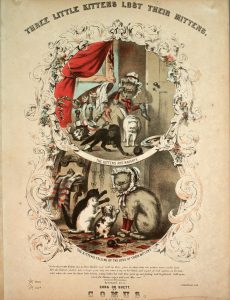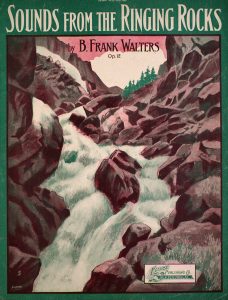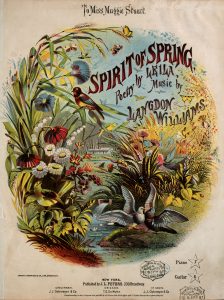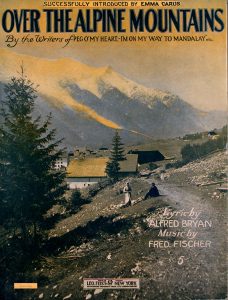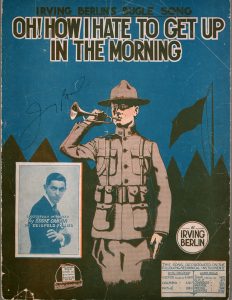The Lester Levy Sheet Music Collection comprises over 30,000 pieces of sheet music published between 1780 and 1980. Donated to the University by Lester Levy, the collection is renowned for its extensive survey of popular music—music that was mass produced for as large an audience as possible. Through the many songs in the collection, one can trace the development of popular music in the US from blues and ragtime through jazz and onward to most contemporary popular artists.
Perhaps the most notable item in the collection is a first edition of the Star Spangled Banner (one of less than a dozen known in existence, and identifiable by its ironic misspelling of the word “patriotic”). Also included are songs published during various military conflicts, songs from social movements including suffrage and prohibition, and many well-known standards like “God Bless America,” and “Over the Rainbow.”
Levy saw each of these songs as windows into US history—not only into how this history unfolded, but how it was processed by people in homes and on stages. Recognizing the insights this music provided into period attitudes in private and public spaces, Levy sought to curate a collection that would document as much of this history as possible. Today the collection encompasses music representing nearly every social movement, major public figure, and conflict in US history. In his introduction to the collection, Levy offers the following:
“The guide describes briefly the collection of music, which I have built over a fifty-year period. It was approximately that long ago when I began to acquire popular sheet music. My first purchase consisted of twelve lithographed sheets which I saw in a Baltimore shop window, and on which I spent the tremendous sum of six dollars.
Not many months thereafter an opportunity arrived to make a second and larger purchase, for a much higher price, $15 or $20,-and I was on my way. It was soon evident that music of a period was closely tied to the history and mores of the country’s development. It became important to me, therefore, to demonstrate how popular music followed America’s fortunes, and that, in the main, is the background of the collection as it exists today.”
-Lester Levy
The documented subject areas in the collection are incredibly diverse, ranging from international relations to sewing machines. For example, one can find 928 songs about period clothing and dress, 988 about celebrities, 1019 about campaigns and battles, and a respectable 32 songs concerning gazebos. However, the most commonly expressed sentiment in the collection is love.
While there are of course thousands of songs that express love for one another, there are also songs about love for animals. These include the “Pet Robin Polka” and “Three Little Kittens” (in which the composer wrote the words for the repeated chorus: “Miew, miew, miew, miew, miew, miew, miew, miew”).
There are songs about love of nature, including “Sounds from the Ringing Rocks,” “Spirit of Spring,” and “Over the Alpine Mountains”:
There are songs about love of sleep, including an autographed edition of Irving Berlin’s “Oh! How I Hate to Get Up in the Morning”:
Finally, there are songs about love for self. Will Mahoney, an early vaudeville performer, wrote humbly in his song, “I Love Me”:
“I love me, I love me, I never leave my sight. I love me, I love me, I’m with me day and night. Myself and me we have a fight, and I can’t fall to sleep at night ‘till I kiss me- then I’m all right, I’m wild about myself.”
Self-love is also reflected in the music from one of the most beloved films of all time, The Sound of Music. The film begins with Maria leaving the Nonnberg Abbey to work for the von Trapp family, singing of her anxious confidence:
“So, let them bring on all their problems, I’ll do better than my best. I have confidence
they’ll put me to the test! But I’ll make them see I have confidence in me!”
Regardless of the topic, the Levy Collection is a unique and useful resource that provides insight into US history through one of the earliest forms of social media—sheet music. The digitized collection can be found at https://levysheetmusic.mse.jhu.edu/.

